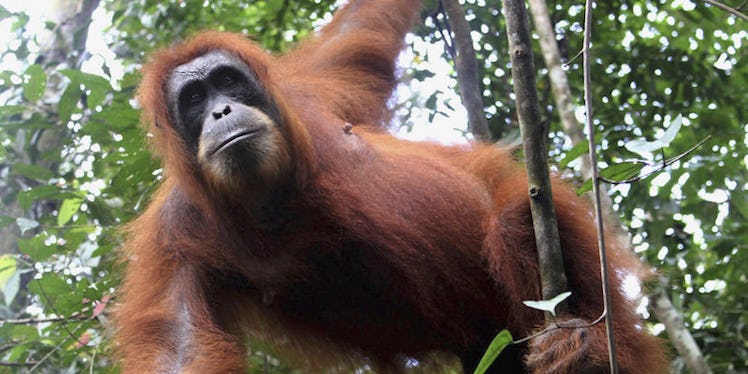
Washing Your Hair Is Making Orangutans Go Completely Extinct
The shampoo you use, the pizza you devour late at night, your lipstick and even your favorite chocolate all likely contain palm oil — the most widely used vegetable oil on the planet.
According to the World Wildlife Fund, it's in roughly half of all the consumer products you'd find in your local supermarket.
But the high demand for palm oil is rapidly contributing to deforestation in places like Indonesia and Malaysia, which is having a devastating impact on a number of species.
In the past quarter century, the Independent reports, over 25 percent of Indonesia's forests — roughly 76 million acres — have been cleared.
Much of these forests were cleared in order to make room for palm oil plantations. It's a lucrative industry.
In 2014 alone, Indonesia produced 33.5 million tons of palm oil, which generated $18.9 billion in export revenue, according to Mongabay.
One of the animals that's been hardest hit by this trend is the Borneo orangutan.
The International Union for the Conservation of Nature (IUCN) recently designated the Borneo orangutan as critically endangered, which places it in the highest risk category the IUCN assigns.
In July, the IUCN stated,
Bornean orangutan populations are declining as the forests they live in are turned into oil palm, rubber or paper plantations, and others are killed by humans.
To put this into perspective, between 1950 and 2010, the Bornean orangutan's population fell by more than 60 percent, according to the IUCN's Red List of species.
The population is projected to decline another 22 percent by 2025.
Correspondingly, Alan Knight, chief executive of International Animal Rescue, which operates a rescue center in Borneo, told the Independent,
If the current destruction of the rainforest continues, then I have absolutely no hope that any orangutans will remain in the wild. I would probably say 10 years if we cannot stop the destruction. I think the Sumatran will go before then if they don't sort out the situation they are in. It's a real struggle and we are losing the battle.
In other words, the Borneo orangutan could be extinct by 2026.
As Kelsey Kennedy notes for Quartz, the Bornean orangutan is one of our closest relatives. With that said, it's tragic how little regard we seem to have for its wellbeing or even long-term existence.
Deforestation linked to the palm oil industry also adds a huge amount of carbon dioxide to the atmosphere, contributing to climate change.
As Susan Callery, the manager of the Earth Science Public Engagement Office at NASA's Jet Propulsion Laboratory, explained,
In 2007, I finally scraped together the funds to travel to Borneo. [...] On my trip, I observed more incredible wildlife and natural beauty than I can possibly describe. I also saw acre after acre of once-pristine rainforests that had been transformed into barren moonscapes; rivers devoid of life and polluted by palm oil effluent and heavy metals; orphaned baby orangutans whose mothers were killed in palm oil plantations as agricultural pests. I learned that the forest home of many of these magical creatures is disappearing rapidly and suffering from the impacts of slash-and-burn agriculture. Since rain forests are the largest carbon sinks, when destroyed they release massive amounts of carbon dioxide. Deforestation is the second largest manmade source of atmospheric carbon dioxide, after fossil fuel burning.
If we want things to change, we have to work toward being more responsible in terms of our palm oil consumption.
It would be nearly impossible to completely avoid items with palm oil, given its prevalence in consumer products.
But we can make an effort to ensure items we purchase only contain palm oil ingredients that were produced sustainably.
The video below from WWF International on the Round Table on Sustainable Palm Oil the efforts to help in this regard. It's only five minutes long, and it's well worth the watch.
And click here for information from the RSPO on sustainable palm oil products.
Citations: Quartz, Independent, IUCN, NASA